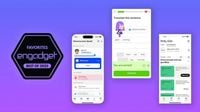In an age where learning a new language is often a popular New Year's resolution, various apps are stepping up to make the process not only accessible but also enjoyable. Among them, Qlango stands out with its gamified approach, offering a lifetime subscription to all 56 languages for just $39.99, a significant reduction from its regular price of $119. This app employs a unique question-and-answer method that encourages users to think and respond in their target language, making the learning experience interactive and engaging.
Qlango's innovative design incorporates hints and a scientifically proven spaced repetition technique, ensuring users effectively retain vocabulary. The app focuses on teaching 6,679 commonly used words across languages, providing a solid foundation for real conversations. As users progress, they can challenge themselves through six different difficulty levels, making it suitable for learners at various stages.
For those with busy schedules, Qlango allows flexible learning while maintaining accountability through weekly study goals. This flexibility is crucial for many learners who struggle to find consistent time for language study. Whether it's Dutch, Hebrew, or Uighur, Qlango promises a comprehensive language learning experience.
While Qlango is an excellent option, it’s not the only player in the language learning app market. Engadget, a tech review site, has highlighted several other notable apps that cater to different learning styles and preferences. For instance, Babbel offers a more traditional approach to language learning, guiding users through various levels of vocabulary and phrases. With a monthly subscription of $18 or an annual plan costing about $108, Babbel also provides live lessons with a tutor in small groups, allowing for personalized attention.
Babbel's lessons are designed to be low-pressure, focusing on listening and spelling to improve writing skills. The app also features AI conversation partners that help users build stories in their target language, enriching the learning experience. However, some users may find the transition to advanced levels challenging, and the cost of the annual plan can be a deterrent for some.
Another popular choice, Duolingo, takes a different approach by gamifying the learning process. Users are motivated to return daily through a system that tracks scores and attendance, creating a sense of accountability. The free version offers a wide range of language learning opportunities, while the premium Super Duolingo version costs $13 a month or $84 for a year. For those seeking even more interaction, Duolingo Max includes an AI chatbot to enhance conversational practice, priced at $30 monthly or $168 annually.
Duolingo’s design allows users to start at their appropriate skill level, making it easy for beginners and more experienced learners alike to engage with the material. However, some users may find the frequent notifications and gamified elements a bit overwhelming.
If music is a passion, Lirica offers a unique twist by teaching languages through song lyrics. This app not only helps users understand vocabulary but also contextualizes it within popular songs. With a subscription cost of $9 monthly or $25 annually, Lirica provides a fun way to learn while enjoying music from artists like Shakira. However, its library is limited to just three languages, which may not appeal to everyone.
For those looking to practice speaking, Speak uses AI tools to simulate real-life conversations. This app allows users to practice without the pressure of immediate correction, making it an excellent choice for learners who may feel anxious about speaking. Speak costs $20 monthly or $99 annually but currently only supports two languages. Users appreciate the live corrections and personalized learning paths based on their mistakes.
Memrise, with its extensive library of over 200 languages, offers a comprehensive learning experience but comes at a steep cost of $60 per month. Meanwhile, Rosetta Stone has transitioned into the digital age, utilizing visual learning tools to teach languages. However, its lifetime subscription price of $400 may be prohibitive for many potential learners.
Finally, HelloTalk provides a social platform for language learners, connecting users with native speakers worldwide. While it allows for cultural exchange, users should be cautious as some may use the platform for dating rather than learning.
As the landscape of language learning continues to evolve, these apps demonstrate that there is no one-size-fits-all solution. Each offers unique features that cater to different learning styles and preferences. Whether you're looking for gamified experiences, traditional lessons, or music-based learning, there’s an app that can meet your needs.
As of March 26, 2025, the variety of language learning apps available reflects the growing demand for accessible and effective language education. With options like Qlango, Babbel, Duolingo, and others, anyone can embark on their journey to mastering a new language, making the world a little smaller and a lot more connected.


